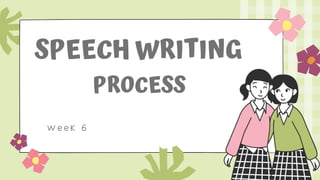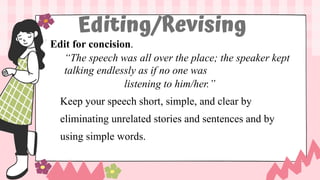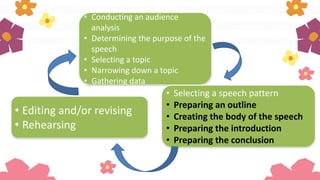Q2 Week 6 Speech Writing Process.pptx
- 2. Define speech writing Differentiate the stages or processes in speech writing Discuss the principles of effective Speech Writing OBJECTIVES OF THE DAYŌĆÖS LESSON
- 3. What are components of the speech writing process? 1 4
- 4. What are the elements of an outline? 1 4
- 5. 1 4 2 1. It is the foundation of your speech. 2. It restates the main idea of your speech. 3. This provides explanations, examples, or any details that can help you deliver your purpose and explain the main idea of your speech.
- 6. GROUPWORK 1 4 2 1. Arrange the sample outline about ŌĆ£ProcrastinationŌĆØ according to the elements of an outline. 2. Label the parts. 3. Be ready to present your output to the class.
- 7. GROUPWORK ’āś Improper waste disposal causes environmental problems. ŌĆó Wastes contaminate the soil. ŌĆó Wastes contaminate the water. ŌĆó Wastes can cause floods ’āśThere are ways to eliminate wastes and protect the environment. ŌĆó Reducing, reusing, and recycling can help eliminate wastes. ŌĆó People should start doing these at home. 4 As of today, there is an alarming increase of wastes in our community. ŌĆó According to Solid Waste Management Office, if we do not take immediate action, we might face more perils caused by natural calamities. ŌĆó Now, I am going to talk about how to eliminate wastes and protect the environment. We must act now. ŌĆó This solution should be supported by the local government. ŌĆó Let us learn from the lessons in natural calamities we have experienced.
- 8. Editing/Revising 1 4 2 .. Ō”ü Editing/Revising your written speech involves correcting errors in mechanics, such as grammar, punctuation, capitalization, unity, coherence, and others. Andrew Dlugan (2013), an award-winning public speaker, lists six power principles for speech editing. Edit for focus. ŌĆ£So, whatŌĆÖs the point? WhatŌĆÖs the message of the speech?ŌĆØ Ensure that everything you have written, from introduction to conclusion, is related to your central message.
- 9. Editing/Revising 1 4 2 .. Edit for clarity. ŌĆ£I donŌĆÖt understand the message because the examples or supporting details were confusing.ŌĆØ Make all ideas in your speech clear by arranging them in logical order (e.g., main idea first then supporting details, or supporting details first then main idea).
- 10. Editing/Revising 1 4 2 .. Edit for concision. ŌĆ£The speech was all over the place; the speaker kept talking endlessly as if no one was listening to him/her.ŌĆØ Keep your speech short, simple, and clear by eliminating unrelated stories and sentences and by using simple words.
- 11. Editing/Revising 1 4 2 .. Edit for continuity. ŌĆ£The speech was too difficult to follow; I was lost in the middle.ŌĆØ Keep the flow of your presentation smooth by adding transition words and phrases.
- 12. Editing/Revising 1 4 2 .. Edit for variety. ŌĆ£I didnŌĆÖt enjoy the speech because it was boring.ŌĆØ Add spice to your speech by shifting tone and style from formal to conversational and vice- versa, moving around the stage, or adding humor.
- 13. Editing/Revising 1 4 2 .. Edit for impact and beauty. ŌĆ£ThereŌĆÖs nothing really special about the speech.ŌĆØ Make your speech memorable by using these strategies: surprise the audience, use vivid descriptive images, write well-crafted and memorable lines, and use figures of speech.
- 14. Editing/Revising 1 4 2 .. Ō”ü Rehearsing gives you an opportunity to identify what works and what does not work for you and for your target audience. Some strategies include reading your speech aloud, recording for your own analysis or for your peers or coaches to give feedback on your delivery. The best thing to remember at this stage is: ŌĆ£Constant practice makes perfect.ŌĆØ
- 16. ŌĆó Conducting an audience analysis ŌĆó Determining the purpose of the speech ŌĆó Selecting a topic ŌĆó Narrowing down a topic ŌĆó Gathering data ŌĆó Editing and/or revising ŌĆó Rehearsing ŌĆó Selecting a speech pattern ŌĆó Preparing an outline ŌĆó Creating the body of the speech ŌĆó Preparing the introduction ŌĆó Preparing the conclusion
- 17. THANK YOU! Do you have any questions for me?

















